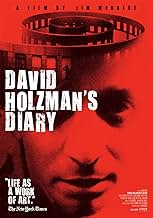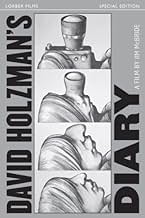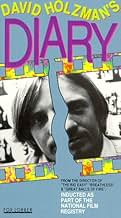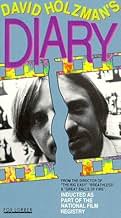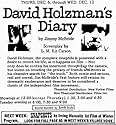IMDb-BEWERTUNG
6,5/10
1957
IHRE BEWERTUNG
Füge eine Handlung in deiner Sprache hinzuA young filmmaker decides to make a movie of his life.A young filmmaker decides to make a movie of his life.A young filmmaker decides to make a movie of his life.
- Auszeichnungen
- 2 wins total
Eileen Dietz
- Penny Wohl
- (as Penny Wohl)
Mike Levine
- Sandra's Boy Friend
- (as Michel Lévine)
Robert Lesser
- Max, Penny's agent
- (as Bob Lesser)
Empfohlene Bewertungen
This film grabs you in from the get go, and takes you into the mind of a hapless young filmmaker. A true historic masterpiece! It's something completely different and unique from any other moviegoing experience you will ever have. Don't miss a chance to pass this up. A true step forward in filmmaking.
Mock cinema vertite about a young filmmakers consternation at finding 'truth' and putting it on film. Insightfully examines how we define reality, how our perceptions can cloud it, and whether it is really possible to show it on film. Probably to talky for most, but still quite thought provoking. Filled with some really offbeat ideas and camerawork. Among them: filming the faces of people at a bus stop while we hear excerpts from the McCarthy hearings. Also photographing a entire night of tv viewing each minute and then playing them back frame by frame. A very low budget movie, made by some very young filmmakers, with a very original point of view.
Jim McBride's mockumentary is a delightful satire about the filmmaker's compulsion to capture everything on camera, and also a wry character study of one young man who uses his "art" as a pretext for complete self-absorption. This film from the sixties eerily forecasts our present absorption with social media.
As played by L.M. Kit Carson, David is on an irreconcilable mission: to at once understand a world in chaos, and cocoon himself from it in his own cinematic world.
He is lucky that his girlfriend ( Eileen Dietz) didn't chuck his camera when he filmed her sleeping nude.
One thing I found fascinating is the "Observer Effect" as defined by David. Once you start filming, you cease to have reality as you change in response to the film. It is not real life, it is a movie. One would wonder here, if you wore a GoPro Hero all day would you record a normal day, or would you look for the abnormal?
With irritation, alienation, a sex-hungry lady sitting in a car in the middle of traffic, and a few bloody noses, this one "Diary" worth peeking into.
As played by L.M. Kit Carson, David is on an irreconcilable mission: to at once understand a world in chaos, and cocoon himself from it in his own cinematic world.
He is lucky that his girlfriend ( Eileen Dietz) didn't chuck his camera when he filmed her sleeping nude.
One thing I found fascinating is the "Observer Effect" as defined by David. Once you start filming, you cease to have reality as you change in response to the film. It is not real life, it is a movie. One would wonder here, if you wore a GoPro Hero all day would you record a normal day, or would you look for the abnormal?
With irritation, alienation, a sex-hungry lady sitting in a car in the middle of traffic, and a few bloody noses, this one "Diary" worth peeking into.
If you liked the Blair Witch Project, this is where they probably got the idea. Every film school shows this as an example of a completely fictional documentary, that works. Done in cinema verite style, the fictional angst filled life of a documentary maker falls apart, as he chronicles its disintegration, largely caused by his obsession with filming it as it crumbles. Like watching a train wreck.
Kit Carson's face has a relevancy even today, cutting through the demographic piece of the cake: he reminds one of Jean Pierre Leaud which is arguably one of the motives casting him as David Holzman, and he also reminds one of us today Beck's face, and his maybe signature lyric "I'm a loser baby, so why don't you kill me."
But David Holzman as his name says is a man holding - holding what? A camera for sure, the instrument that ultimately makes him fall apart; pursuing his credo stated right at the beginning and maybe, uneasily, hilariously put to the test for the rest of it, that is Jean-Luc Godard's phrase that the cinematic truth runs 24 times a frame. I liked the fact that he rises a bit his voice and somehow overacts his name with an American accent as if it was not far away from jeans, luck, God and art.
I admit I expected something closer to the "I do this, I do that" poetic compositions Frank O'Hara was doing a bit earlier the same period, for he too queered and mocked supposedly avant-guard procedures, or at least their seriousness. I thought David Holzman's self-indulgence slightly needed the more constant alertness he exemplified in scenes like the one in the park, with rows of old people on benches and a dubious voice-over international commentary - that broke away from the rather one-dimensional reaction poor Penny has and seems that she conceives her late boyfriend a simple stupid stalker.
For me the anthology scene is the one with David's friend who talks on camera theorizing about film, in front of a pop mural at his place - and when you think the way the tableau conveys it that you are about to have an illumination on Rosenquist and his tableaux and the American predicament or what, David's friend moves and goes back to the wall resting his head on the crotch on the figure behind. This is great sophisticated camp.
And for me it echoes finely when the end comes with an unexpected intuition on the other side of the pitch: in the end David Holzman says he would not have done it; the 24-times truth seems to him something close to Bartleby territory. "I would prefer not to". Not to do it he says, but this, exactly, seems to me a grim acceptance of the American predicament. What I mean by this is that Bartleby never says "not to do it", nothing comes after his "not to," his denial is a formal gesture without content, that is why his presence is so unbearable. David is not Bartleby but he stumbles upon his presence, perhaps the way Zapruder stumbled upon a President's assassination some years back in his own brand of home cinema verite, and this is what troubles David and makes the film something else than a diary.
But David Holzman as his name says is a man holding - holding what? A camera for sure, the instrument that ultimately makes him fall apart; pursuing his credo stated right at the beginning and maybe, uneasily, hilariously put to the test for the rest of it, that is Jean-Luc Godard's phrase that the cinematic truth runs 24 times a frame. I liked the fact that he rises a bit his voice and somehow overacts his name with an American accent as if it was not far away from jeans, luck, God and art.
I admit I expected something closer to the "I do this, I do that" poetic compositions Frank O'Hara was doing a bit earlier the same period, for he too queered and mocked supposedly avant-guard procedures, or at least their seriousness. I thought David Holzman's self-indulgence slightly needed the more constant alertness he exemplified in scenes like the one in the park, with rows of old people on benches and a dubious voice-over international commentary - that broke away from the rather one-dimensional reaction poor Penny has and seems that she conceives her late boyfriend a simple stupid stalker.
For me the anthology scene is the one with David's friend who talks on camera theorizing about film, in front of a pop mural at his place - and when you think the way the tableau conveys it that you are about to have an illumination on Rosenquist and his tableaux and the American predicament or what, David's friend moves and goes back to the wall resting his head on the crotch on the figure behind. This is great sophisticated camp.
And for me it echoes finely when the end comes with an unexpected intuition on the other side of the pitch: in the end David Holzman says he would not have done it; the 24-times truth seems to him something close to Bartleby territory. "I would prefer not to". Not to do it he says, but this, exactly, seems to me a grim acceptance of the American predicament. What I mean by this is that Bartleby never says "not to do it", nothing comes after his "not to," his denial is a formal gesture without content, that is why his presence is so unbearable. David is not Bartleby but he stumbles upon his presence, perhaps the way Zapruder stumbled upon a President's assassination some years back in his own brand of home cinema verite, and this is what troubles David and makes the film something else than a diary.
Wusstest du schon
- WissenswertesShot on a budget of only $2,500.
- PatzerHolzman shows a montage of TV he says he watched on a Tuesday night in July 1967. He was wrong about the night. Although it's hard to date the Huntley/Brinkley Report newscast or the Joey Bishop Show late-night talk show, neither Batman, Star Trek or the Dean Martin Show aired on a Tuesday night. In July 1967, Batman aired on Wednesday and Thursday nights and Star Trek and the Dean Martin Show aired on Thursday nights. The montage is from a Thursday night.
- Zitate
David Holzman: It was like rooms everything is so perfect, that everything is so perfect that they have to be kept, that because this random particular accidental state so meaningful, so, so touching, it's so touching, it's so beautiful.
- VerbindungenEdited into 365 days, also known as a Year (2019)
Top-Auswahl
Melde dich zum Bewerten an und greife auf die Watchlist für personalisierte Empfehlungen zu.
- How long is David Holzman's Diary?Powered by Alexa
Details
- Laufzeit
- 1 Std. 14 Min.(74 min)
- Farbe
- Sound-Mix
- Seitenverhältnis
- 1.37 : 1
Zu dieser Seite beitragen
Bearbeitung vorschlagen oder fehlenden Inhalt hinzufügen


